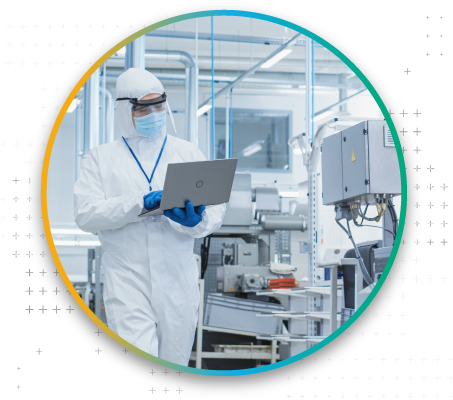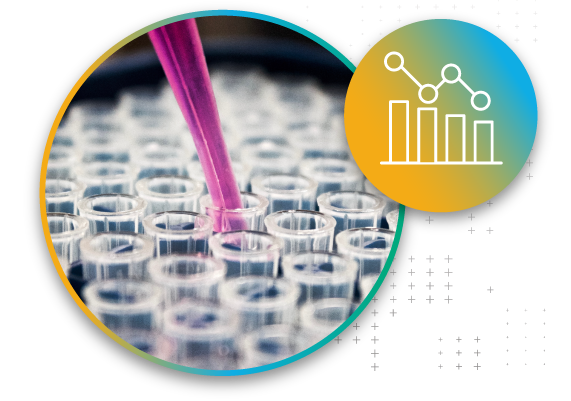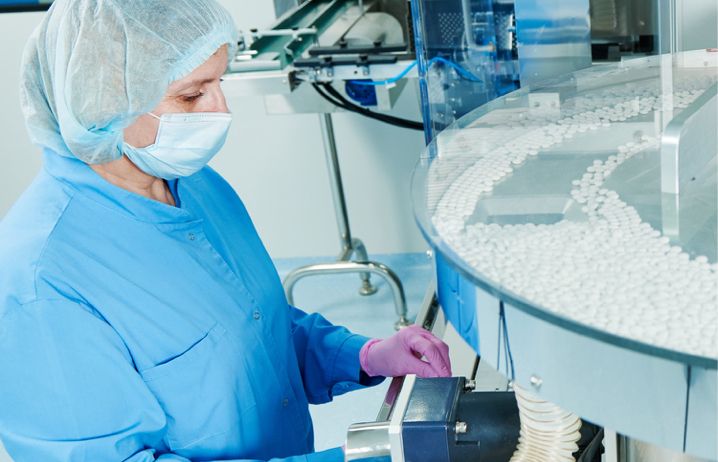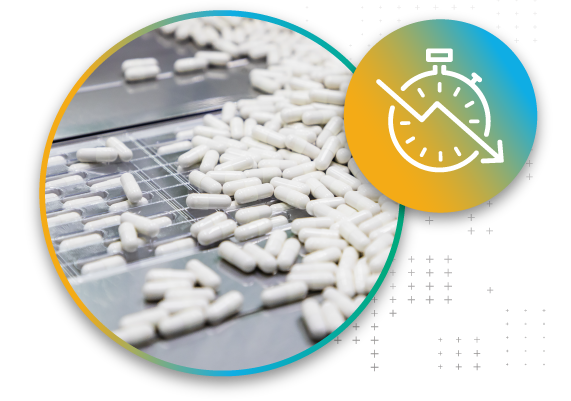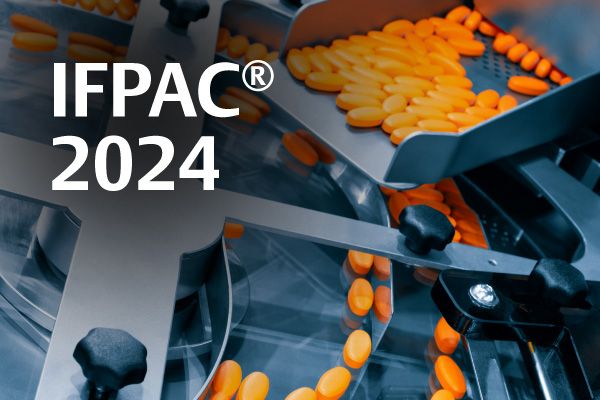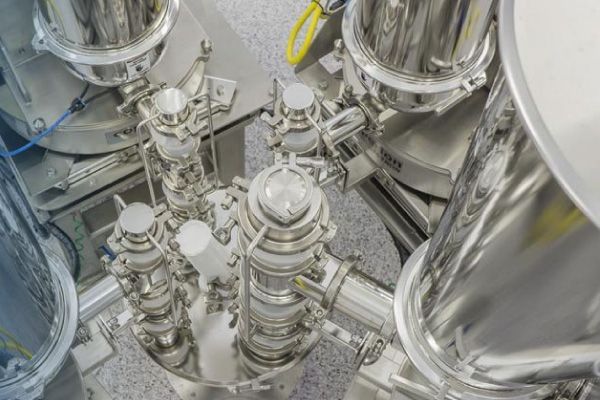Combined Strength, Commitment and Expertise Create a Powerful Turnkey System Offering for Continuous Pharmaceutical Processes
Salina, KS, USA (July 2022) – Coperion K-Tron is pleased to announce its partnership with process automation and software experts Emerson and Continua Process Systems to provide highly versatile, turnkey continuous direct compression skids for pharmaceutical and biotech manufacturers. These ultramodern modular skids are state-of-the-art fully integrated platforms that include all the hardware and software necessary for a complete direct compression tableting continuous manufacturing line. Best of all, the platforms are designed for complete modularity of the hardware and software to allow end users the flexibility to select different processes including dry and wet granulation, different unit operations, plus the ability to manufacture multiple products on a single skid. Sharon Nowak, Global Business Development Manager for Coperion’s food and pharmaceutical business states “The collaboration between the three companies has offered each of us to contribute our own state-of-the-art design, technologies, and process strengths for a completely modular, and versatile footprint, which in turn will enable further adoption and growth for continuous processing applications in the pharmaceutical industry.”
Top Features of the Turnkey Direct Compression Skid
The custom-built direct compression skid includes automatic powder dispensing via up to six Loss-In-Weight (LIW) Coperion K-Tron Feeders, combined with the end users’ blender and tablet press of choice. The process automation and orchestration are controlled by an Emerson DeltaV™ distributed control system (DCS) with Continua’s ContinuousPlant® Software Suite application platform that provides for much faster, simpler, and less costly systems integration between feeders, blender, and subsequent unit operations using the OPC-UA data exchange standard for digitally connected systems.
The Emerson’s DeltaV DCS ensures quality, compliance, and optimized implementation in a cost-effective continuous manufacturing line. From applying automation during process development to collecting data with context during manufacturing, Emerson’s DeltaV technology and manufacturing systems software solutions can improve data management, real-time product quality, reliability, and operating costs. Emerson’s solutions for Process Analytical Technology (PAT)-based manufacturing help streamline continuous processes by integrating multivariate data and real-time process models to manage critical quality attributes and predict final product quality at any time.
Designed for the Ultimate in Flexibility
The feeder/mixer skid design is engineered for the ultimate in flexibility, featuring ease of accessibility for maintenance and cleaning as well as portability for transporting the system from suite to suite. The sophisticated blend of Coperion K-Tron’s technologically advanced pharmaceutical LIW feeders and hygienic refill systems, specifically designed for continuous processes and for handling difficult materials such as Active Pharmaceutical Ingredients (APIs) and excipients, combined with Continua Process Systems’ ContinuousPlant Software Suite enables the seamless integration of real-time in-process PAT orchestrations with advanced process control, OPC-UA process equipment interoperability, and real-time RTD-based materials traceability and tracking. The ContinuousPlant user configurable Process Orchestration Layer software is uniquely engineered for modular continuous manufacturing processes and enables users to run multiple products with different processes on a single continuous manufacturing line through its recipe control feature. In the case of OSD manufacturing, this feature also allows users to make a product using dry granulation one day and a different product using wet granulation the next.
The powerful combination of these design features will enable the pharmaceutical industry to produce drugs more predictably, efficiently, faster and of higher quality using the most technological and accurate pharmaceutical feeders in the industry with the latest and most advanced real-time process automation and data management systems, and continuous manufacturing application software available. Terry Spaeth, Co-Founder of Continua Process Systems noted that “These modular digitally connected skids will give users the flexibility to reconfigure the process, and create, modify or troubleshoot recipes without having to revalidate the software resulting in better overall asset utilization of their continuous manufacturing lines.”
Coperion K-Tron Innovative Loss-in-weight Feeder Technology
Coperion K-Tron has over 4,500 pharmaceutical feeders installed worldwide with feeders currently used in the production of six current FDA-approved small molecule drugs produced on continuous processes. Its newly developed line of K3 pharmaceutical feeders was specifically designed for continuous pharmaceutical applications. The interchangeability of the QT20 and QT35 feeder modules ensures ultimate flexibility in feed rate requirements. Specialized designs for refill, difficult-to-handle materials, as well as pressure equalization ensure solutions for a variety of challenges in pharmaceutical powder feeding. In addition, the newest updates to both the Coperion K-Tron unique load cell technology and KCM-III Controller ensure the fastest weight measurements and highest accuracy performance in the industry.
Additional Service Options
For continuous manufacturers that want even more built into their direct compression skid, turnkey project options include process science/powder testing conducted in one of the worldwide Coperion test labs, complete equipment selection and even the opportunity to view equipment demonstrations prior to purchase. Modular hardware and software can be customized and designed to a customer’s specific needs as well as integrating Residence Time Distribution (RTD) models for highly accurate, real-time raw materials traceability and tracking. Process Analytical Technology (PAT), Factory Acceptance Testing (FAT), commissioning support, and validation assistance is available if a customer chooses.
Single Point Responsibility for Assured Project Success
Although the collaboration of collective minds between Coperion K-Tron, Emerson and Continua developed the custom-built modular continuous direct compression skid, Coperion K-Tron will take ownership of the full project implementation including design, construction, logistics and project management. All integration and design for the mechanical, electrical, and controls will be a joint-partnership between the three companies utilizing the team’s vast experience in executing projects for the life sciences industry.
Coperion is the international market and technology leader in compounding and extrusion systems, feeding and weighing technology, bulk materials handling systems and services. Coperion designs, develops, manufactures and maintains systems, machines and components for the plastics, chemicals, pharmaceutical, food and minerals industries. Within its two divisions – Polymer and Strategic Markets / Aftermarket Sales and Service – Coperion has 2,500 employees and nearly 30 sales and service companies worldwide. Coperion K-Tron is a brand of Coperion. For more information visit www.coperion.com or email [email protected].






